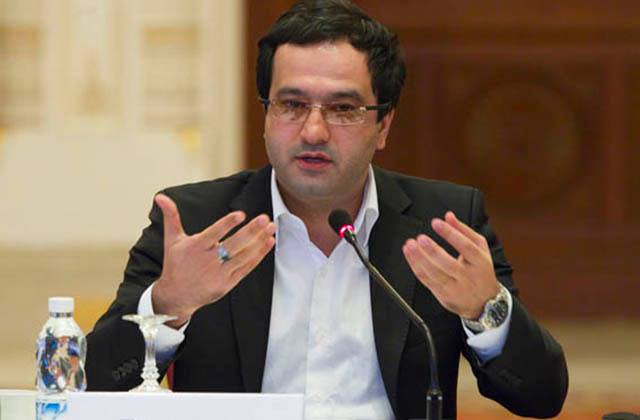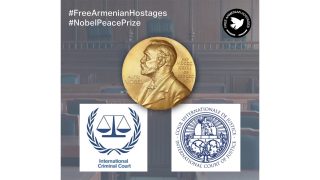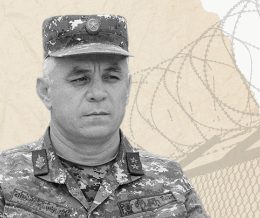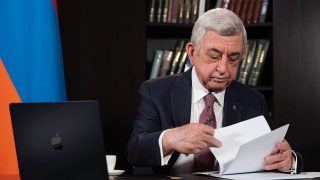
“Iran will attempt to keep ongoing situation on NK conflict zone in the center of its attention”

Armenia and Iran are celebrating 25th anniversary of establishment of diplomatic relations, in connection with which Foreign Ministers Edward Nalbandian and Mohammad Javad Zarif exchanged messages, recording the friendly, historical and cultural, political threads connecting the two countries. 25th anniversary is marked by development of new directions in those relations. Security component is strengthening.
This year the parties are actively developing cooperation in the fields of military and defense. From this perspective the official visit at the invitation of Hossein Dehghan, Minister of Defense and Armed Forces Logistics of the Islamic Republic of Iran, the delegation led by Defense Minister of Armenia Vigen Sargsyan left for Iran, where different meetings have been launched tended to deepen cooperation in the field, regional stability, peaceful settlement of Artsakh issue. During the visit V.Sargsyan and Hossein Dehghan have held negotiations.
The Armenian delegation visited Tehran-based Malek Ashtar University of Technology, one of the key research directions of which are defense programs. Noting that military industry is of key importance for Armenia, Vigen Sargsyan attached great importance to deepening Armenian-Iranian defense cooperation also in scientific sphere. Afterwards, the Armenian delegation also visited “Iran Electronics Industries” specialized in engineering and implementing technological solutions for the defense spectrum.
Recently president of Iran Hassan Rouhani reflected to Iran’s role in NK conflict settlement and establishment of peace in the region. At the meeting with ambassadors and representatives of international organizations he touched upon security issues and the necessity of establishing peace in the region. Moreover, it became known that in late March NKR conflict settlement issue will be touched upon within the visit of Iran’s president to Moscow.
Kayhan Barzegar, Director of the Institute for Middle East Strategic Studies (IMESS) in Tehran, told “168 Hours” that 25th anniversary of Armenia-Iran diplomatic relations was strengthened by Hassan Rouhani’s official visit to Armenia, during which the friendly atmosphere and willingness to deepen relations was reconfirmed, which has always been in relations, but wasn’t used as a result of existence of international sanctions against Iran.
“Fields and directions have been outlined by president Rouhani’s visit to Yerevan. I repeatedly stated that those relations, besides friendly and respectful context, include concrete interests, which connect Iran and Armenia. Main interest is export of gas to Europe, the Black Sea-Caspian Gulf project, which will become a source of immense benefits for both countries, in particular, for Armenia and the whole region. If I’m not mistaken Iran already export small volume of gas to Armenia, and this may really become a continuous and extending project.
You know such projects not only are positive from the perspective of economic interest, but regional integration as well, as current approaches of world development, decline toward globalization pushes countries to small block cooperation and strengthening of the region. Currently this is becoming an inevitable challenge, which may be solved through implementation of such projects,” he clarified.
Reflecting to Russia’s role and approaches in the region, that these projects will be banned by Russia, Barzegar said it should be taken into consideration that in the South Caucasus and in the region, where Armenia is located, Russia traditionally has had positions of a leading power. In his words this means, like in case of any other country following its national interests, in case of a superpower those interests are being imposed on other countries.
He considers Armenia, however, continues developing relations with Iran as much as it’s currently possible on account of the point that Iran hasn’t fully overcome the past, and currently faces new threats—Trump administration and anti-Israeli contrasts. According to Barzegar these points still continue keeping Iran back from its possibilities.
“If Trump’s sanctions become a reality, we’ll face much more complicated challenges. However, prior to that there are no considerable obstacles for regional integration,” the expert said.
Reflecting to strengthening of security component in Armenia-Iran relations, Barzegar qualified Vigen Sagsyan’s visit to Iran quite noteworthy, which was widely elucidated by Armenian and Iranian media outlets. According to him this visit is a crucial milestone ahead of deepening relations in this field.
Barzegar reminded that Sargsyan had meetings not only with Iranian leadership, but also heads of defense field, basically shaping further cooperation in the field. ”In this field, like in the economic one, Armenia-Iran relations don’t comply with existent potential.
Judging from the information, that Sargsyan visited a company providing army’s logistical support, he intended to get acquainted with Iran’s success in the field and maybe with the perspective of further cooperation, as Iran may be useful to Armenia in this regard,” he said.
Referring to NK conflict, he said Iran’s position hasn’t changed. “Iran attempts to show a neutral position in this issue. Although Iran’s activeness toward Karabakh usually irritates Azerbaijan, as interests of Iran and Armenia on NK conflict zone are a bit identical. Not accidentally, Iran’s president Rouhani stressed about the southern border. NK conflict interests Iran by this very part, here stability is an issue of Iran’s national security. Thus, against the background of raising regional activity and our interests in this very issue, Iran will attempt to keep the ongoing situation on NK conflict zone, at the same time, not interfering with OSCE MG works,” Kayhan Barzegar said.
By Araks Martirosyan























